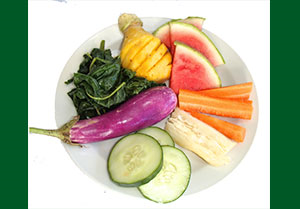Last Updated on 10 years by Publishing Team
According to the World Health Organisation, Cancer is responsible for 11% of total deaths in Fiji, and of this amount, around 30% of all cancer deaths are attributable to lifestyle factors including poor diet, inadequate physical activity, tobacco use and excess alcohol intake. Cancers that have a strong association with diet are those of the digestive tract – esophagus, stomach and bowel.
Although there is no definitive evidence to suggest that nutrition can help cancer progression and recurrence in those already diagnosed with cancer, eating a varied diet across the food groups and focusing on vegetables and fruits is of course recommended and will not do any harm.
Let’s look at the specific areas of nutrition related to cancer:
Obesity
Eating a poor diet often results in being overweight and obesity, which is linked to cancer of the esophagus, post menopausal breast cancer, endometrium, bowel and kidney. The best thing you can do to help reduce your risk of these cancers is maintain a healthy body weight by eating a variety of foods from the different food groups, focusing mainly on vegetables and fruits and avoiding nutrient poor processed foods that are high in fat and sugar. And of course, increase your physical activity wherever you can, any movement counts!
Red Meat
Evidence suggests that there is a link between consumption of red meat, especially processed meats such as sausages, salami and ham, and the risk of developing cancer. Always try and have lean meat only, and avoid processed meats wherever possible, replacing these with white meat or fish. Red meat should be kept to 3-4 times per week and only a small serve, no more than the palm of your hand and palm thickness. Remember to choose lean cuts, not fatty meats.
Alcohol
Drinking alcohol is linked to an increased risk of developing cancer of the bowel, mouth, pharynx, larynx, esophagus, liver and breast. Your risk of developing cancer increases from your first alcoholic drink, and the more you consume, the greater your risk. If you choose to drink, it is recommended that you drink no more than two standard drinks per day to minimise your risk. The risk increases even further if alcohol intake is accompanied by tobacco use.
Vegetables and Fruits
There are two factors to consider when looking at Vegetables and Fruits, firstly is their role in weight management due to their low energy content and high nutrient density and secondly, the role specific nutrients play in cancer protection.
Weight Management – Given the strong evidence linking obesity to certain types of cancers, and the important role vegetables and fruits play in weight management, they are an essential part of a cancer prevention diet. When we make vegetables and fruits the focus of our diet, this takes the place of energy dense and nutrient poor foods, and we naturally have a lower energy intake, and higher fibre, vitamin and mineral intake – helping our metabolism to work optimally.
Specific Nutrients – There is very limited evidence to suggest that one particular nutrient protects against cancer, it is likely that it is a combination of the fibre, vitamins, minerals, antioxidants and phytochemicals that all work together to prevent cancer and other disease. The recommendations are for mostly fresh vegetables and fruits as opposed to a supplement, a mixture of raw and cooked and as many different types and colours as possible for maximum health benefits.
References and Further Reading
World Health Organization – Noncommunicable Diseases (NCD) Country Profiles, 2014.
Cancer Council Australia – Food and Nutrition page
Cancer Council Australia – Obesity page
Cancer Council Australia – Alcohol page

